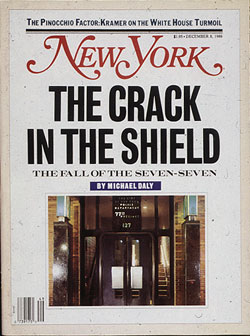 |
From the December 8, 1986 issue of New York Magazine.
Early on the morning he was to be arrested, police officer Brian O’Regan of the 77th Precinct arrived at his mother’s house with a cardboard box. He filled the box with a three-page will, a pair of spit-polished police shoes, an identification card from when he was a deputy sheriff in Florida, a thank-you letter from a citizen he had helped after a burglary, and a Christmas card from more than a decade ago that still held a $10 bill his grandmother had enclosed. He then neatly sealed the top with tape.
Shortly before dawn, Brian’s mother came out of her room in a flannel nightgown. She saw that her 41-year-old second son’s soft blue eyes were reddened and that his face was stubbled with a five-day beard. She asked if he wanted to talk.
“He said he didn’t have time,” Dorothy O’Regan remembers. “He said, ‘I can’t, I have to appear.’”
In the basement, Brian found his dead father’s razor. He shaved and told his mother he had to leave. She followed him as far as the back door of the small brick house. She called to him as he hurried into the dark and misty morning.
“I said, ‘Brian, you’re very upset. Drive very carefully,’ ” Dorothy remembers.
The mother closed the door against the chill. Brian drove his gray Subaru down the treelined lane where he had been raised. He rolled through the hushed suburban town of Valley Stream, and he came to the turn that would have taken him toward Brooklyn. He pulled the steering wheel the other way and headed east.
At 6:20 A.M., Brian checked into the Pines Motor Lodge on Route 109 in Lindenhurst. He registered as Danny Durke and paid $35. The desk clerk gave him the key to Room 1.
On a fluorescent-light fixture across from the bed, Brian propped a laminated Honor Legion plaque he had received for facing down a gunman armed with a .45-¬caliber automatic. He sat alone in this room 32 miles from Brooklyn as the twelve other indicted cops of the “Seven-Seven” surrendered on charges ranging from peddling crack to selling stolen guns. He opened a small notepad and wrote of watching a television report of his friends being arrested.
“Good morning, I missed my appointment,” Brian wrote.
Around noon, a Suffolk County police officer cruised the parking lot in search of a trio who had been robbing cash machines. Brian apparently panicked at the sight of the squad car, and he checked out. Desk clerk John Drake later discovered that he had left behind the Honor Legion plaque sitting on the light fixture.
“We figured he’d be back,” Drake says. “A cop would want to keep it. It would be important to a cop.”
By 12:30 P.M., Brian was again in the Subaru. He traveled farther east, and the housing developments gave way to bleak pine barrens. He kept driving into the gray afternoon and turned down Route 27 into Southampton.
At 3:30 P.M., Brian checked into the Southampton Motel. He registered as Daniel Grant and paid $37.65 for a night. He went into Room 2 with a green garbage bag containing his frayed uniform. He also had a pint of Seagram’s 7 Crown and a plastic bottle of 7 Up.
As he sipped a 7 and 7 from a paper cup, Brian again opened the notepad and began writing about his years as an officer in the 77th Precinct in Crown Heights-Bedford Stuyvesant. He had joined the Police Department in 1973 with the aim of being a good cop. He had soon discovered that this was not a simple ambition in a ghetto precinct that had become a dumping ground for the department’s misfits, malcontents, and rebels.
“I can’t swim in a cesspool, can you?” Brian now wrote.
Day after day, Brian had commuted to a combat zone where each year saw as many as 80 people murdered, an additional 100 raped, some 400 shot, and more than 3,000 robbed. He had made an arrest for drugs or gun possession again and again, only to see the “skel” back on the street the next day. The written law had seemed to leave him powerless. An unwritten law had kept him silent when he first saw an officer steal.
“I will not turn. No. Never. I won’t turn on another cop.”
By 1982, twin desires to be “one of the boys” and to get back somehow at the skels had led Brian to start shaking down drug dealers. He and several other cops were eventually seized by a frenzy of stealing. One of them would put a coded call over the radio, and they would assemble to hit narcotics spots with sledgehammers and ladders and sometimes axes borrowed from a firehouse. They had gleefully kicked in doors and swung on ropes through windows.